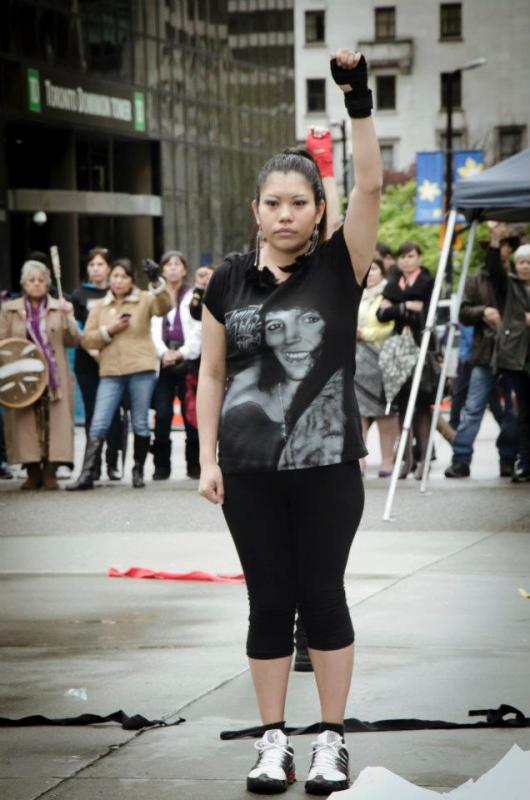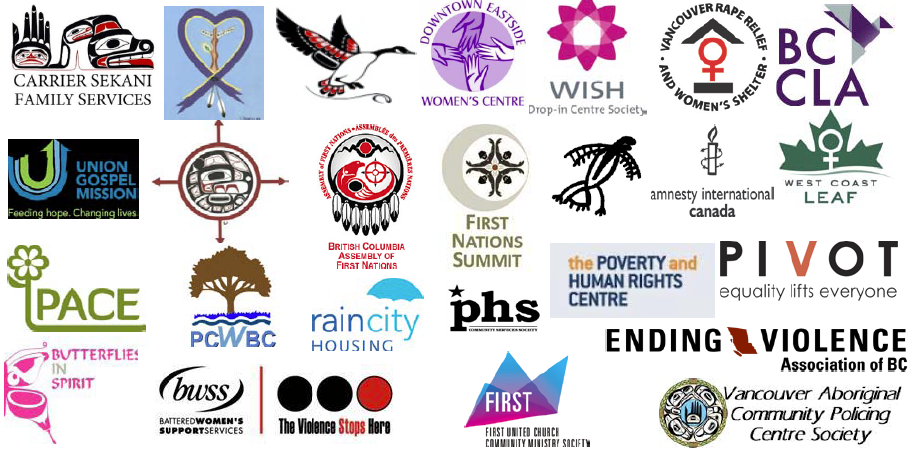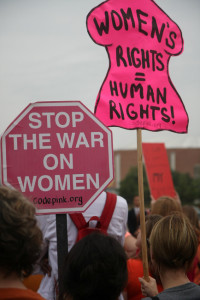BWSS Joins Chelsea Poorman’s Family, Indigenous, and Community Organizations to Demand VPD Investigation
Battered Women Support Services Joins Chelsea Poorman’s Family, Indigenous, and Community Organizations to Demand VPD Investigation
(Xʷməθkʷəy̓əm (Musqueam), Sḵwx̱wú7mesh (Squamish) and səlilwətaɬ (Tsleil Waututh)/Vancouver, B.C. – May 13, 2022) – Battered Women Support Services (BWSS) joins the family of Chelsea Poorman and Indigenous nations across these lands demanding accountability from the Vancouver Police Department (VPD) for their gross and appalling mishandling of Chelsea Poorman’s disappearance and tragic death. The VPD recently announced at a press conference that the death of 24-year Chelsea Poorman, a member of the Kawacatoose First Nation in Saskatchewan living in Vancouver and missing since September of 2020, was “not suspicious.”
Says Kirstin Scansen-Isbister, Research, and Policy Analyst at BWSS, “We send our heartfelt condolences to the family and loved ones of Chelsea Poorman. We join in anger and grief with the Kawacatoose First Nation, Federation of Sovereign Indigenous Nations, Union of BC Indian Chiefs, and BC First Nations Justice Council who are all condemning VPD’s inaction, challenging the VPD’s decision to deem Chelsea’s death ‘not suspicious,’ and are calling for a full VPD investigation into her death. Frustration is mounting about police inaction in cases of violence against women, and especially violence against Indigenous women. Our communities know that the RCMP and VPD have failed Indigenous women and their families on far too many occasions.”
For the past year and a half, Chelsea Poorman’s family have been searching for her, with very little support from the VPD who waited ten days before announcing her initial disappearance in 2020. This week her family revealed that, sadly, her body was found in Vancouver’s Shaughnessy neighbourhood with her remains not intact. Sheila Poorman, mother of Chelsea Poorman, has told media “We’re going to fight for Chelsea and we’re going to fight for the truth and what happened to her. We’re not going to sit by and let them say it’s not suspicious and there’s no foul play.”
According to BWSS Executive Director, Angela Marie MacDougall, “The VPD’s inexcusable inaction into the death of Chelsea Poorman flies in the face of the National Inquiry into Missing and Murdered Indigenous women, girls and 2SLGBTQQIA people and the 231 Calls for Justice. In British Columbia, the 2012 provincial Report of the Missing Women Commission of Inquiry clearly lays out that missing and murdered Indigenous women and girls were consistently ‘forsaken’ by the VPD for decades.”
Twelve years ago, 22-year-old Cree woman Ashley Machiskinic plunged to her death from the Regent Hotel in Vancouver’s Downtown Eastside. Seconds later, her shoes were tossed out, yet the VPD ruled her death as a suicide. Amidst the provincial Pickton inquiry, protests to reopen the investigation into Machiskinic’s death, and an occupation of the VPD building leading to arrests of three women, the VPD created the SisterWatch Program to combat violence against women in the DTES. “From the tragic death of Ashley Machiskinic to the tragic death of Chelsea Poorman, we see that nothing has changed in the VPD’s response. Programs like SisterWatch amount to public relations; systemic racist misogyny is still pervasive in the VPD. The VPD must be held accountable for failing to uphold their own stated commitments to end violence against Indigenous women, girls, and two-spirit people,” says MacDougall.
“This is a clear display of the VPD’s apathy towards our precious Indigenous sisters that go disproportionately missing in Canada on a daily basis,” further states Michelle LaBoucane, Indigenous Women’s Counsellor at Battered Women’s Support Services. “Why was important information from Chelsea’s family never properly followed up on the VPD? Why did her family’s many questions go unanswered and why did they receive such little support from the VPD during the investigation? We know that if Chelsea was a white woman, this investigation would have taken a very different turn. This investigation has been botched and not taken seriously right from the beginning. This is why we, as Indigenous people, need to have our own community-based investigative teams working to find our own people when they go missing. My heart and prayers go out to Chelsea’s loved ones, and that they find answers and justice.”
Concludes Lavita Trimble, Indigenous Women’s Counsellor at Battered Women’s Support Service, “I am enraged that we are in 2022 with a national crisis of thousands of missing and murdered indigenous women, girls, and two-spirit people, and authorities continue to neglect and dismiss cases of violence against Indigenous women. How could this young woman be missing for 2 years, be found with half her skull and fingers missing, and have her death labeled as ‘not suspicious’ by the VPD? What more would it take to force the VPD to label this death as suspicious? This is utterly shameful; yet this is the reality of the condition of oppression, violence, and fear under which Indigenous peoples in Canada live. I demand to know: When will we be respected as people, and when will we not be disposable?”
MEDIA CONTACT:
Angela Marie MacDougall, BWSS Executive Director: 604-808-0507

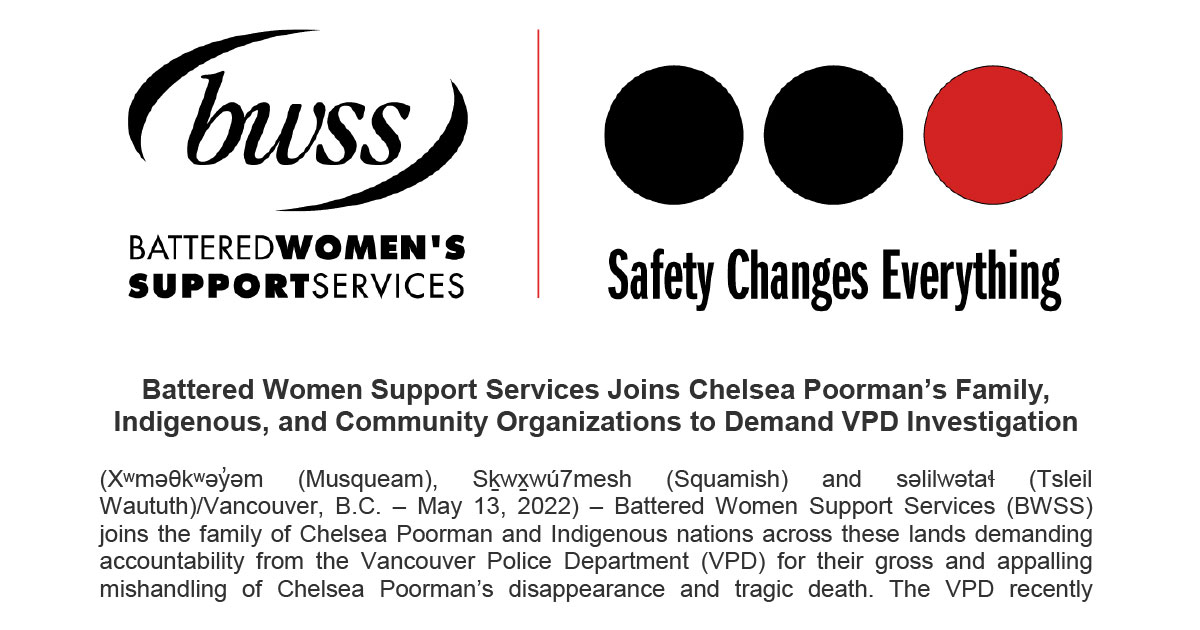
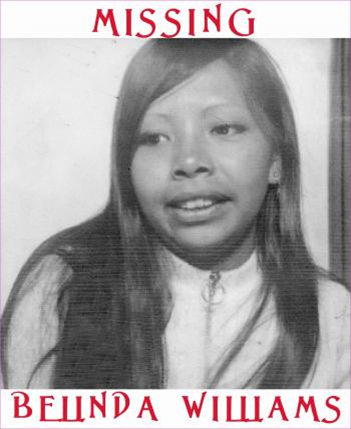 I’m sure a lot of people can relate to this when I say a scary moment in a person’s life is when they lose a child for just a few minutes or even seconds. You and the child are together and then suddenly you aren’t. Your heart begins to race; you can even hear it beating in your head. Everything feels like it’s going in slow motion. You’re panicking, your head is pounding, you start to shake and feel like throwing up. Then, all of a sudden you see the child! You’re so relieved and everything is ok.
I’m sure a lot of people can relate to this when I say a scary moment in a person’s life is when they lose a child for just a few minutes or even seconds. You and the child are together and then suddenly you aren’t. Your heart begins to race; you can even hear it beating in your head. Everything feels like it’s going in slow motion. You’re panicking, your head is pounding, you start to shake and feel like throwing up. Then, all of a sudden you see the child! You’re so relieved and everything is ok.